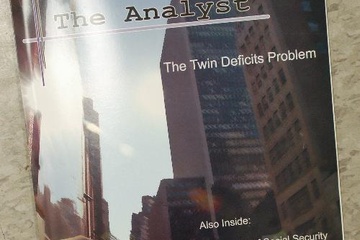The week before Thanksgiving Break marked the release of Tuesday Magazine’s second issue. A painting of a boy-child and his teddy bear on the cover, some symbolism re: blue skies and opportunities... generally good vibes, nothing too weird or esoteric on the inside. Tuesday doesn’t mess around, keeping it clear and straightforward, appealing but not too outlandish.
Back in ’04, it was called Voice Where Prohibited, but the staff got tired of having to explain the pun, and the self-proclaimed general interest magazine was revamped. The name was changed, and the first issue, released last semester, emerged as the best-looking publication at Harvard, printed on heavy paper and set in gorgeous, clear type. Unfortunately, some of the stuff inside was originally written for Expos classes, and more importantly, it wasn’t hard to tell.
This year’s content is much better, and the aesthetic remains impeccable. According to Editor-in-Chief Joshua P. Haas ’07, submissions originally written for class were still fair game (see “The Success of the Jesus Movement,” a solid history paper on page 37), but the editing process was much more vigilant, and pieces usually went through five drafts before they were considered ready.
Still, “general interest” inevitably means a lack of focus. Short stories, poems, paintings, articles, photos, even mathematical proofs—Tuesday keeps them all under its jurisdiction, proudly claiming a “wide-range” of content, a “mixture of stuff.” This issue contains: a scholarly article about the nature of modern art, a sociological look at the gay rights movement; also some short stories and poems with adverbs and adjectives.
So forget focus. Tuesday is a valuable magazine for the casual reader—people who can’t take the smoke in the Advocate building or put up with their crazy “postmodernism.” Tuesday’s for people who like to read articles, not articles; stories, not bories.
That’s on purpose, says Haas, who told Doordopped that his magazine purposefully avoids the Advo’s “emphasis on theory-oriented work,” and focuses instead on playing it straight. “We value writing that’s clear, well-written, non-convoluted but highly polished,” he says. “We tend to get very readable stories that manage to be both entertaining and have some literary significance.”
It’s unity in clarity, a populist alternative to the obscure that welcomes the general public. Something the snobs don’t have to read. The best campus magazine named after a day, for sure.



